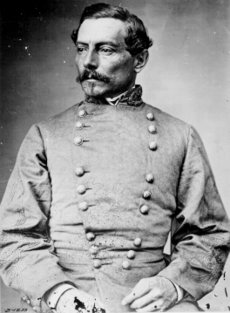P.G.T. Beauregard
From Wikipedia, the free encyclopedia.
Pierre Gustave Toutant de Beauregard (BO-rih-gahrd) (May 28, 1818 – February 20, 1893), best known as a general for the Confederate Army during the American Civil War, was also a writer, civil servant, and inventor.
Contents |
Early life
Beauregard was born at the "Contreras" plantation in St. Bernard Parish, outside of New Orleans, Louisiana, to a white Creole family. His nickname to many of his army friends was The Little Creole (and also Bory, The Little Frenchman, Felix, and The Little Napoleon). He trained at the United States Military Academy at West Point, graduating in 1838, and excelled both as an artilleryman and military engineer. He served as a engineer under Winfield Scott during the Mexican-American War. There, he was brevetted to captain for the battles of Contreras and Churubusco and again to major for Chapultepec, where he was wounded in the shoulder and thigh in 1847. Although little is known of his married life, he was the brother-in-law of future Confederate diplomat John Slidell.
Beauregard briefly entered into politics in his home town, and was narrowly defeated in the election for Mayor of New Orleans in 1858. He was chief engineer in charge of draining New Orleans from 1858 to 1861, and directed the building of the Federal customs house. He then returned to teach at West Point, where he rose to become the Superintendent of the Military Academy in January of 1861, but resigned after only a few days when Louisiana seceded from the Union.
Civil War
Beauregard entered the Confederate Army as a brigadier general in March of 1861, but was promoted on July 21 to be one of the eventual eight full generals in the Confederate Army; his date of rank made him the fifth most senior general. He recommended stationing strong forces to protect New Orleans, but was overruled by President Jefferson Davis; this started friction between Beauregard and Davis that would only intensify as years progressed.
Beauregard's first assignment from the Confederate Government was command of the forces in Charleston, South Carolina, where on April 12, 1861, he opened fire on the Union-held Fort Sumter, regarded as the start of the American Civil War. He and General Joseph E. Johnston led Confederate forces to victory in the First Battle of Bull Run (First Manassas), where they defeated Maj. Gen. Irvin McDowell, one of Beauregard's West Point classmates. During the First Battle of Bull Run, he employed Quaker Guns, something he would use in numerous other battles.
Beauregard was transferred to Tennessee and assumed command of Confederate forces at the Battle of Shiloh when General Albert Sidney Johnston was killed. Although successful the first day of battle, April 6, 1862, Beauregard called off the attack prematurely, assuming that the Union army was defeated. He was forced to retreat the second day after Maj. Gen. Ulysses S. Grant was reinforced and counterattacked. Beauregard later was forced to retreat from his base of supplies, Corinth, Mississippi, by forces under Maj. Gen. Henry W. Halleck.
Beauregard successfully defended Charleston, South Carolina, from repeated Union attacks 1862 – 1864. In 1864 he assisted Robert E. Lee in the defense of Richmond, Virginia, defeating Benjamin Butler in the Bermuda Hundred Campaign near Drewry's Bluff. Success against Butler, his most impressive military victory, caused grandiose thoughts to fill his mind. He proposed to Lee and Jefferson Davis that he lead a great invasion of the North, defeating Grant and Butler, and win the war. Undoubtedly to remove him as an irritant to Lee in Virginia, Beauregard was appointed commander of Confederate forces in the West. Since all of his forces were engaged elsewhere (in Tennessee, Alabama, and Mississippi), he had insufficient resources to halt the superior Union forces under William T. Sherman in their march to the sea. He and Joseph E. Johnston surrendered to Sherman in North Carolina in April 1865.
Postbellum life
After the war Beauregard spoke in favor of civil and voting rights for the recently freed slaves, an opinion not common among high-ranking Confederates.
Beauregard's military writings include Principles and Maxims of the Art of War (1863), Report on the Defense of Charleston, and A Commentary on the Campaign and Battle of Manassas (1891). He was the uncredited co-author of The Military Operations of General Beauregard in the War Between the States (1884). Beauregard and Jefferson Davis published a series of bitter accusations and counter-accusations, blaming each other in retrospect for the defeat of the Confederacy.
General Beauregard declined offers to take command of the armies of Romania (1866) and Egypt (1869).
Beauregard became involved in promotion of railroads, both as a company director and a consulting engineer. He was the president of the New Orleans, Jackson & Mississippi Railroad from 1865 to 1870, and president of the New Orleans and Carrollton Street Railway, 1866 to 1876, for which he invented a system of cable-powered street railway cars.
Beauregard served in the government of the State of Louisiana, first as adjutant general for the state militia, and then less successfully as manager of the Louisiana Lottery. Though considered personally honest, he failed to reform corruption in the Lottery system.
P.G.T. Beauregard died in New Orleans. He is buried there in Metairie Cemetery.
References
- Eicher, John H., & Eicher, David J., Civil War High Commands, Stanford University Press, 2001, ISBN 0-8047-3641-3.


